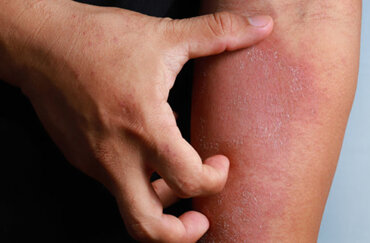Eczema or also known as 'Atopic Dermatitis' commonly affects areas like the inner side of the elbows, knees, wrists and ankles and when exposed to aggravating factors, the condition will flare-up and the skin will become itchy, red and inflamed.
Symptoms
- Skin inflammation and dryness
- Skin redness and flakiness
- Watery fluid weeping from affected skin
- Itchiness
When skin is dry and cracked it is more susceptible to bacterial infections, so the skin may also appear weepy, oozing or bleeding.
Triggers of Eczema
- Contact with irritants
- Heat
- Psychological stresses
- Food allergy – this is rare.
Treatment and Management
- Showers Take showers rather than a bath with lukewarm water.
Replace standard soap with a substitute such as a mild detergent soap free detergent
- Clothing Wear soft, cool clothes; coarse fibres (wool or synthetic) are best avoided
- Irritants Protect your skin from incontinence, dust, water, solvents, detergents, injury.
- Emollients Apply an emollient liberally and often, particularly after bathing, and when itchy. Try avoid perfumed products when possible.
- Topical steroids Apply a topical steroid cream or ointment to the itchy patches for a 5 to 15-day course.
- Antihistamines Antihistamine tablets may help reduce the irritation and are particularly useful at night.
- Antibiotics For secondary infections visit your GP for a course of antibiotics.
Eczema is influenced by lifestyle factors so ask your community pharmacist about managing your eczema. Some people develop flare-ups when there are sudden changes in the weather, so where possible try to anticipate changes in weather (for example, during travel) and prepare yourself with effective treatments.
Stress can also trigger flare-ups so try to avoid or manage stress as best you can. Stress management involves changing the stressful situation, changing the reaction if the situation is unavoidable, practising better health care and making time for rest and relaxation. Getting enough sleep is also an important factor.
Also try to avoid known allergens, like dust mites, pollen and animals, and certain types of clothing, such as wool and synthetics. Some foods can also cause flare-ups - common food allergens include spicy foods, alcohol, food colouring, wheat, eggs, soy and peanut products.
Try to avoid long, hot baths and don’t scratch if you develop itchy rashes. Seek advice from your community pharmacist if you skin appears infected.







